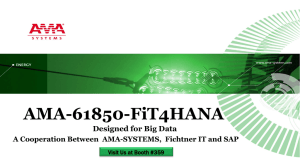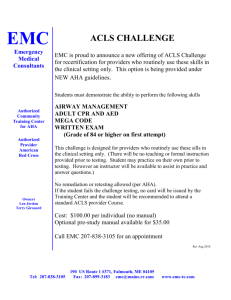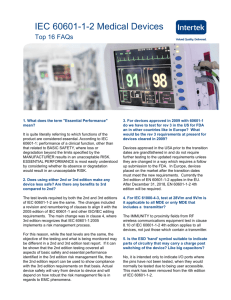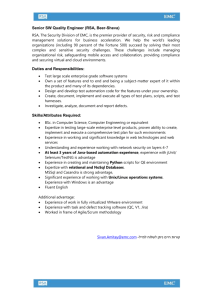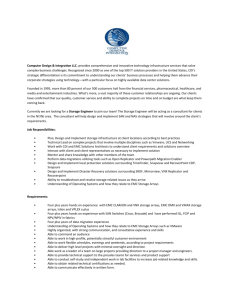IC-EMC Training
advertisement
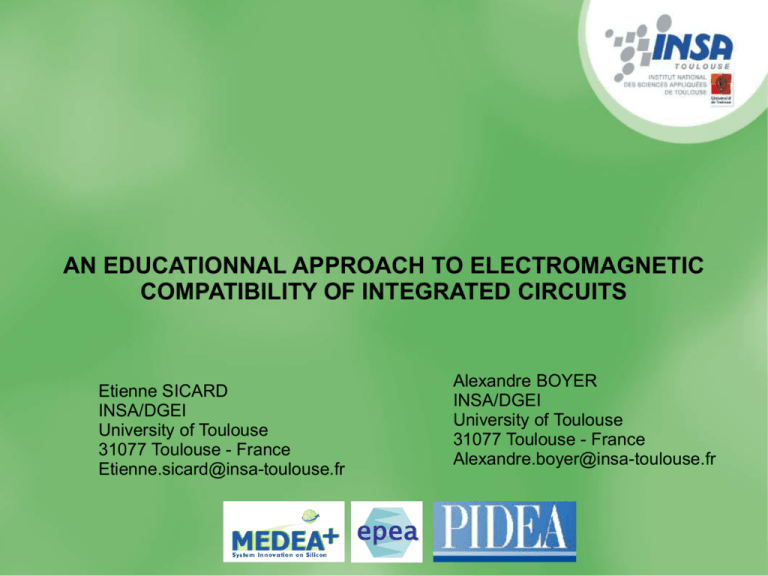
AN EDUCATIONNAL APPROACH TO ELECTROMAGNETIC COMPATIBILITY OF INTEGRATED CIRCUITS Etienne SICARD INSA/DGEI University of Toulouse 31077 Toulouse - France Etienne.sicard@insa-toulouse.fr Alexandre BOYER INSA/DGEI University of Toulouse 31077 Toulouse - France Alexandre.boyer@insa-toulouse.fr 1 SUMMARY 1. CONTEXT 2. EDUCATIONAL NEEDS 3. STANDARDS 4. WHAT IS IC-EMC 5. EXAMPLE 6. EVALUATION 7. CONCLUSION 2 CONTEXT EMC – ONE ACRONYM, TWO CONCEPTS Susceptibility to EM waves Carbon airplane Emission of EM waves Equipements Personnal interferences Boards Safety systems Radar Components Hardware fault Software failure Function Loss 3 CONTEXT TRENDS – INCREASED PARASITIC EMISSION Increased complexity, IOs number, operating frequencies, transient current Technology 180nm 130nm 90nm 45nm 50M 100M 250M 500M 2002 2004 2006 2008 Core Core+ DSP Core DSPs eMem 3A 10 A 32nm Complexity 1G Packaging Embedded blocks transient current 1A 2010 Multicore, DSPs, FPGA, RF multiband Memories Sensor Multicore, Multi DSP Reconf FPGA, Multi RF Memories Sensors 30 A 100 A 4 CONTEXT TRENDS - INCREASED SUSCEPTIBILITY Less voltage margin 150 mV margin Supply (V) 5.0 3.3 I/O supply 2.5 Core supply 1.8 1.2 0.7 0.5µ 0.35µ 0.18µ 90nm Technology 65nm 45nm 32nm 5 CONTEXT PACKAGES AS ANTENNAS Package dimensions are close to lambda/4 at GHz range EMC Issues 6 CONTEXT EMC VALIDATED BEFORE FABRICATION What IC designers and EMC experts are dreaming of… DESIGN Tools This work Training Design Guidelines Architectural Design Design Entry Design Architect EMC Simulations Compliance ? FABRICATION NO GO GO EMC compliant 7 EDUCATIONNAL NEEDS EMC TRAINING AT IC LEVEL – HOW TO START? A nightmare? 8 EDUCATIONNAL NEEDS EMC TRAINING AT IC LEVEL – HOW TO START? A nightmare? dEr I dl 2cos 1 r er 4 j 0 r 3 I dl sin dE 1 r r 2 e r 3 4 j 0 r I dl sin 1 r er dH 4 r 2 P E H * Wr H r2 H2 j Zw r 2 sin 1 3 cos 2 r H r 0 r P r dS Sphere i i RGi (RC LG) i LC 2 2 x t t 2 E 2 Zw with 0 0 I S e r H sin 4 c 2 r 2 2 I S r Wr 2Z w 2 4 c 2 sin 3 d 0 i(x,t) v(x,t) Gv(x,t)C x t 9 EDUCATIONNAL NEEDS THINGS WE NEED TO DO • Illustrate technology scale down – Complexity – Current switching – Impact on EMC • Illustrate package role and complexity • Simulate simple models with simple simulator (SPICE-like) 3D real-time view in Microwind • Post-process in Freq. domain for Spectrum comparison • “see” E, H fields from currents and voltage • Investigate “what if” with students IBIS 3D viewer in Microwind 10 EDUCATIONNAL NEEDS OUR PROPOSAL – KEY FACTS • Give key facts about technology impact on EMC • Introduce standard measurement methods • Simulate first order effects using standard model approaches • Give the basics of – emission prediction – immunity simulation • Give simple design rules for improved design • Address both – Undergraduate, graduate students – Engineers in companies • Leave plenty of space for exercises and real-case problem solving • Fit the course in a one or two days format (cost, duration) 11 EDUCATIONNAL NEEDS OUR PROPOSAL – COURSE OUTLINES • Overview (EMC-IC for managers) • Basic concepts • Measurement methods • Guidelines for improved EMC • Case study • EMC models • Chip-chip coupling 12 STANDARDS EMISSION MEASUREMENT METHODS International Standards IEC 61967 IEC 61967-2 IEC 61967-3/6 IEC 61967-4 (TEM : 1GHz) (Near field scan, 5GHz) (1/150 ohm, 1 GHz) Most usual conducted method Most usual radiated method IEC 61967-5 IEC 61967-7 IEC 61967-2 (WBFC, 1 GHz) (Mode Stirred Chamber: 18 GHz) (GTEM 18 GHz) www.iec.ch 13 STANDARDS IMMUNITY MEASUREMENT METHODS International Standards IEC 62 132 IEC 62132-3 IEC 62132-4 IEC 62132-2 (Bulk Current Injection : 1 GHz) (Direct Power Inj 1GHz) (TEM/GTEM) Most usual radiated method Most usual conducted method www.iec.ch IEC 62132-5 New proposal: Still research: (WBFC 1 GHz) (LIHA : 10 GHz) (NFS 10 GHz) 14 STANDARDS MODEL APPROACHES International Standard IEC 62 433 1. ICEM-CE - Conducted RF emission 2. ICEM-RE - Radiated RF emission www.iec.ch 4. ICIM-CI - Conducted RF immunity 4. ICIM-RI - Radiated RF immunity 15 WHAT IS IC-EMC IC-EMC - A TOOL FOR EMC PREDICTION A schematic editor to enter macro-models An interface to WinSpice analog simulator A post-processor to compare simulated with measured spectrum An Electromagnetic solver to simulate radiated field Freeware, online, 250 pp documentation, 15 case studies 16 WHAT IS IC-EMC SCHEMATIC EDITOR SPICE compatible Key tools Main analysis Immunity Smith Spectrum Chart analysis simulation IC, package and PCB model Near-field IBIS Impedance interface simulation Basic simulation symbols 17 EXAMPLE CONDUCTED EMISSION Emission prediction approach Simulation Measurements IEC 62 433 Core Model Package Model Probe Model Test board Model Analog Time Domain Simulation Frequency measurements IEC 61 967 Fourier Transform Time-domain measure Fourier Transform Compare dBµV vs. Frequency 18 EXAMPLE CONDUCTED EMISSION Emission spectrum analysis Probe Model Test board Model Conversion to Win-SPICE Analog Time-Domain Simulation Package Model Fourier Transform Core Model dB vs Freq (log) conversion 19 EXAMPLE CONDUCTED EMISSION Emission spectrum analysis Frequency measurements Compare dBµV vs. Frequency What if? • Effect of decoupling • Effect of package supply pairs • Effect of current reduction • … 20 EVALUATION AUDIENCE Since 2002, more than 20 sessions involving 300 students and engineers have been organized – ISEN France – ENSME France – On-Semiconductors – NOKIA – APEMC Beijing One-day or two-days format. The majority of students said – They understood the mechanisms of parasitic emission and susceptibility – They felt confident in their ability to handle EMC at IC level 21 EVALUATION QUESTIONS # Question 1 I appreciated the contents of the training. 2 The level of the training is in accordance with my expectations. 3 The balance between theory and practice was acceptable 4 The contents was adapted to life-long learning. 5 I appreciated the documents given in the training. 6 I appreciated the way the training was taught 7 The contents is clearly related to my work/studies. 8 I may use the contents directly in my activities 9 The lecturer followed the initial planning 10 Overall I was satisfied with the quality of this course. 22 EVALUATION 7. The contents is clearly related to my work/studies. RESULTS 8. I may use the contents directly in my activities Answers to questionnaire 70% % response 60% 50% 40% 30% 20% 10% 0% 1 2 3 4 5 6 7 8 9 10 Evaluation item # Strongly agree Agree Neutral Disagree Strongly disagree 23 CONCLUSION An environment for EMC prediction at IC level and trainings has been developed The tool is free and is based on measurement and model standards Trainings help students and engineers to understand the mechanisms of parasitic emission and susceptibility As little theory as possible As much practice and examples as possible Positive feedback from trainees concerning the tool usage for the illustration of EMC concepts (80 – 90 % satisfaction rate) 24 REFERENCES • • • • E. Sicard, A. Boyer, “IC-EMC v.2 User's Manual” ISBN 978-2-87649-056-7, July 2009, 320 pages, INSA Editor C. Dupoux, S. Akue Boulingui, E. Sicard, S. Baffreau, N. Bouvier, "Measurement and Simulation of Electromagnetic Interference in 3G Mobile Components“, EMC Compo 2009, November 2009, Toulouse, France. S. Akue Boulingui, C. Dupoux, S. Baffreau, E. Sicard, N. Bouvier, B. Vrignon, "An Innovative Methodology for Evaluating Multi-Chip EMC in Advanced 3G Mobile Platforms", IEEE Symposium on EMC, 2009, Austin, USA. S. Bendhia, M. Ramdani, E. Sicard, Electromagnetic Compatibility of Integrated Circuits, book published by Springer, USA, 2006, 0-387-26600-3 The tool, manual and course slides are online at www.ic-emc.org 25 THANK YOU FOR YOUR ATTENTION 26

